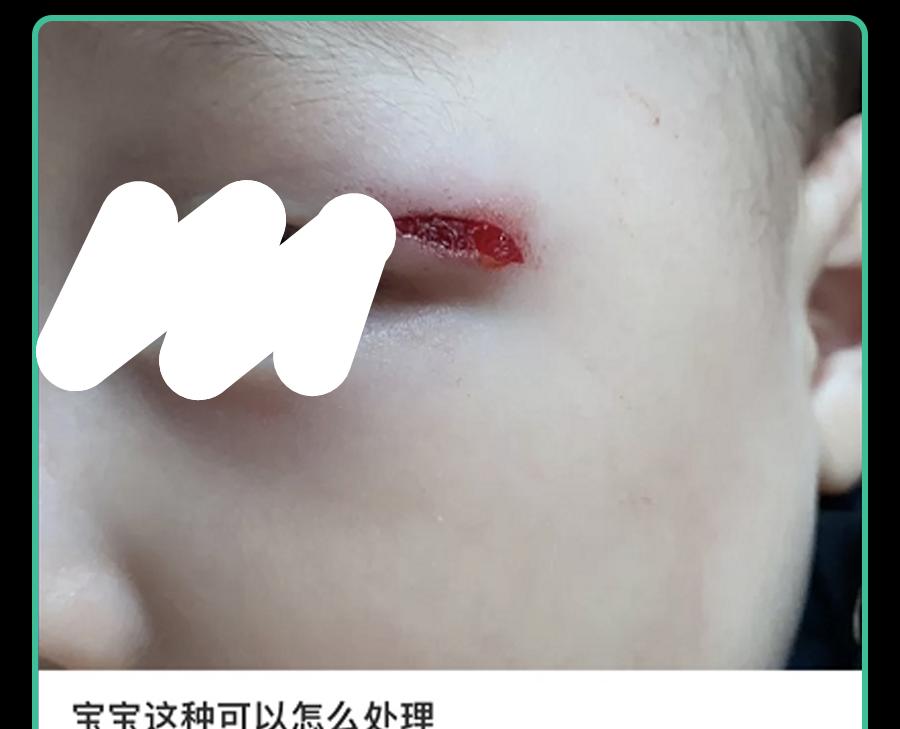01
Do you know which of the following 4 situations really needs to "break the cold"?
Eye bruises

Pick me
Rusty iron scratches
Pick me
scald
Pick me
A cut in the palm of your hand
Pick me
I believe that 9 of the 10 parents in this question rely on guessing!
If you've just clicked on all the options, you're going to see the cat...
(Yes, there is no definitive answer)
I didn't fool you, after all, the expert said:
It is impossible to judge according to the three dimensions of "wound size", "depth", and "injurious object"!!
(Whispering Bibi: If you're the kind of person who judges "by feelings," you're really scared to death... )
Image source: Scientific Family Parenting Original
I searched for a lot of information all over the Internet and found that many clinicians have such an attitude towards "tetanus injections":
No specific situation
I can fight to the fullest
Let's take a look at this one:
When fans asked the doctor "if he was cut by a kitchen knife, do you want to fight", the doctor replied without asking anything: "Yes".
Source: Network
And when fans say again and again: "Maybe you don't need to fight, right?" "At the time
The doctor replied:
Source: Network
Simply put: many clinicians adhere to the principle of "being able to fight to the fullest!".
This is also the misunderstanding pointed out in the "Expert Consensus on Tetanus Immunization prevention in China":
The tetanus expert consensus states:
There is a disconnect in the immune prevention of tetanus, with the vaccinator responsible for vaccinating tetanus and the clinician injecting passive immunizers against tetanus. Clinicians know little about the role of vaccines, leading to the misuse of passive immune agents for tetanus.
Source: Figure
You may be a little confused when you see this sentence, what is it: the vaccinator is responsible for vaccinating the "tetanus vaccine", and the clinician is responsible for injecting the "tetanus passive immune agent".
Is the "tetanus vaccine" different from the "tetanus passive immunizer"? Aren't they all tetanus needles?
Image source: Scientific Family Parenting Original
What we ordinary people call "tetanus injections" often refers to this "passive immune agent".
So the expert's meaning of this is:
People who understand tetanus are still giving children a free "tetanus vaccine"; people who don't know so well are vaccinating everyone in an emergency by judging the "passive immunization agents" that need to be vaccinated.
Therefore, the phenomenon of being able to fight to the end is endless!
Image source: Scientific Family Parenting Original
emmm...... Then you may not know that the "tetanus needle" has a major flaw!
Image source: Scientific Family Parenting Original
In 2018, there was a popular article on the Internet "Son fell, but unexpectedly went back to the ghost door...", detailing that after his son was abused "tetanus", he was directly and severely allergic and admitted to the ICU:
During tetanus opening, the emergency department physician prescribes tetanus without communicating. I didn't ask if my baby had a history of vaccination, nor did I ask parents if they wanted to choose immunoglobulins.
This story of tetanus that almost separated yin and yang, after watching it, my heart was broken!!
It also proves once again that there is no scientific basis for the use of the break exemption after injury without distinguishing between specific circumstances.
So under what circumstances does it take to get a "tetanus injection"?
1. First of all, you must know the "age" and "tetanus vaccination history" of your baby.
This is very, very, very important!!
Because according to the consensus of tetanus experts, it is confirmed that those who have been vaccinated against DTP in the whole process do not need to use "DTP" or "tetanus antitoxin" within 5 years.
The children born in 1988 have most likely been vaccinated.
Image source: Scientific Family Parenting Original
That is, a child born after 1988 (now it should be a child daddy!) ), have basically been vaccinated against DTP (i.e., vaccinated against tetanus).
Image source: Scientific Family Parenting Original
Remember "Has baby been vaccinated" before moving on
2. Judge whether the wound is dirty or not.
The bacteria that cause us to get tetanus are called tetanus bacilli. The bacteria are widely distributed, so it is theoretically possible for any wound to contaminate the bacteria. But to talk about toxicity without dose is to play hooligans!
Returning to reality, the bacteria are highly concentrated in: feces, soil, saliva, ashes, and rusty tools (e.g., needles, barbed wire, etc.) but not just metals.
Therefore, experts divide "wounds are not dirty" into these 3 levels: (the possibility of contracting tetanus also increases in turn)
Image source: Scientific Family Parenting Original
At this point, you have to have a rough judgment about your child's wound.
Then combined with the child's "vaccination history", you can come up with "whether to break the cold"!
(If you can't remember clearly, please open the small book of vaccinations and check the DTP vaccine record.) )
According to the 2019 Guidelines for the Use of Tetanus Vaccines and Passive Immunization Agents after Trauma, the criteria for judging are as follows
Image source: Scientific Family Parenting Original
That is to say: only the last 1 case requires the removal of the cold needle, and the rest of the case only needs to be vaccinated.
This picture must be long! press! protect! exist!
Image source: Scientific Family Parenting Original
Then you look at the 3 situations at the beginning of the article and you know why there is no affirmative answer, right?
Image source: Scientific Family Parenting Original
So, wait who asked me in the comments section
"Just scratched a little skin, do you need to break the cold?"
"Bitten by a kindergarten kid, do you want to break the cold?"
Source: Network
Finally: soil, incense ash, firewood ash and other soil methods cover the wound, which is more likely to cause disease.
PS: Think about when you were a child, your life was quite big...